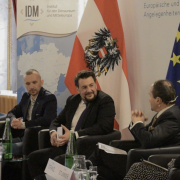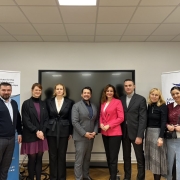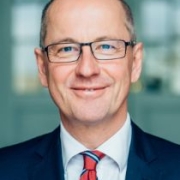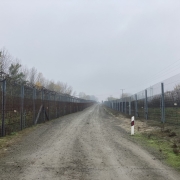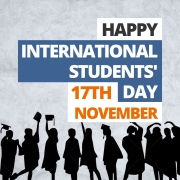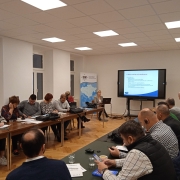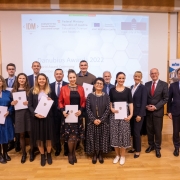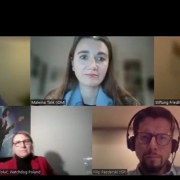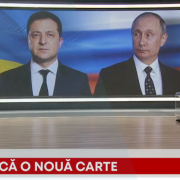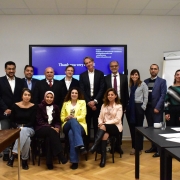Delegation visit from the Autonomous Province of Vojvodina to IDM

On 30 November 2022 a delegation from Vojvodina (Serbia) met with Teresa Stummer (Department for International and European Affairs, Federal State of Lower Austria, Working Community of the Danube Regions/ARGE Donauländer) and Sebastian Schäffer at our offices in Hahngasse 6. The delegation also attended the Danube Conference organised, amongst others, by IDM and ARGE Donauländer in the Austrian Ministry for European and International Affairs the day before.
With the presidency of the ARGE Donauländer coming to an end, which has been held by the Autonomous Province of Vojvodina since 2020, the projects implemented were revised and evaluated. During the meeting also future activities were discussed – amongst others the official transfer of the presidency during an event planned for April.
A video currently in production will highlight the importance of the sub-national level and cross-border cooperation as well as their synergies in the Danube Region. Cooperations between regional media outlets were also taken into consideration.
A future collaboration between the delegation and the IDM itself was discussed as well. The Institute for the Danube Region and Central Europe will celebrate its 70th anniversary in 2023, during that year different events will be organised in each country of their collaboration partners, including Serbia. The 10th Danube Cultural Conference – returning to Novi Sad in April 2023 – could be the perfect setting for a cooperation between the two partners, where the IDM could organise a side-event. Further details on the organisation will be planned during the upcoming months.
The meeting closed with the remarks on the importance of working together and on the inclusion in the different activities carried out along the Danube.
Author:
Elisa Magris
Meet our Chairman!

Friedrich Faulhammer will chair the Institute for the Danube Region and Central Europe (IDM) for the next three years, which was confirmed in the ordinary session of the General Assembly on 4 October 2022 at the Landhaus St. Pölten.
Friedrich Faulhammer has been rector of the University for Continuing Education Krems (Danube University Krems) since 2013. He studied law in Vienna and then worked from 1985 to 1990 at the Institute for Legal History at the University of Vienna and in the legal department of the university management. He then moved to the Federal Ministry of Science and Research in 1990, where he played a key role in shaping Austrian and European university policy, including the 2002 University Act, and especially after he became head of the university section in the ministry in 2005 and later its secretary general.
At the most recent General Assembly, Faulhammer was re-elected chairman of the Danube Rectors’ Conference for the two-year term of office starting in 2023, having already held this position for the 2017-2018 period. In 2018 he was elected to the board of directors of the Ludwig Boltzmann Society (LBG), and since 2021 he has been a member of the university council of Vienna University of Education. In 2019 he was appointed to the board of the Institute for the Danube Region and Central Europe (IDM), where he served as deputy chairman from 2020 to September 2022, before being elected chairman.
Three questions for the new chairman:
- What is it like to succeed Erhard Busek as chairman of the IDM? In which direction should the IDM develop with you as chairman? How can/will you promote this direction?
In his many years as chairman, Erhard Busek has had a strong influence on the IDM. He was filled with the idea of a united Europe in which the countries of the Danube Region play an important role and in which the potential of Central and South-Eastern Europe is used for the development of the entire continent. Aware of this work, I strive to continue to pursue this vision of the IDM, to promote the democratic, peaceful and sustainable development of societies in Central and South-Eastern Europe through dialogue. The task assigned to the IDM and which I would like to push forward is to strengthen its cross-border expertise through scientific research and to promote mutual understanding by concentrating on cooperation in the region. The war in Ukraine presents us with a special challenge and requires us to strengthen connections with this country, which is also a Danube riparian state, and to keep channels of exchange open. Another focus is certainly the Western Balkans’ rapprochement with the European Union, which has only recently gained new impetus. Here it is important to proactively bring the IDM’s expertise and connections in this part of the Danube Region into this approach.
- You have worked with the IDM for many years and have also been vice president of the board, so you know the IDM inside and out. In your opinion, what are the strengths of the IDM? Where do you see opportunities for improvement?
The IDM has a great team and an excellent network in the countries of the Danube Region at different levels, be it science, civil society, business, culture or politics. Therein lies the strength of the IDM: in linking these different perspectives and points of view and as a hub in the exchange between Europe’s centre, Brussels, and the Danube Region. It is important to keep the vision of the IDM in mind and to make relevant contributions to the development discourse of the Danube Region through profound, scientifically developed expertise. This will require focusing and concentrating on those issues that are important for the immediate development of the countries in Central and South-Eastern Europe, and that help to reduce existing disparities and counteract growing imbalances. These include, among other things, the topics of science, education and research.
- Professionally, you combine the role of rector of the University for Continuing Education Krems with that of chairman of the IDM. But what about Friedrich Faulhammer as a private individual? What do you like to do in your free time, what are your hobbies?
I dedicate the little free time I have to my family, my wife and my now grown-up sons. In addition, I like to do voluntary work, for example my work with the volunteer fire brigade in the municipality where I live. And apart from my direct professional topics, I am particularly interested in questions of institutional governance, which also accompany and occupy me in my free time.
International Students’ Day
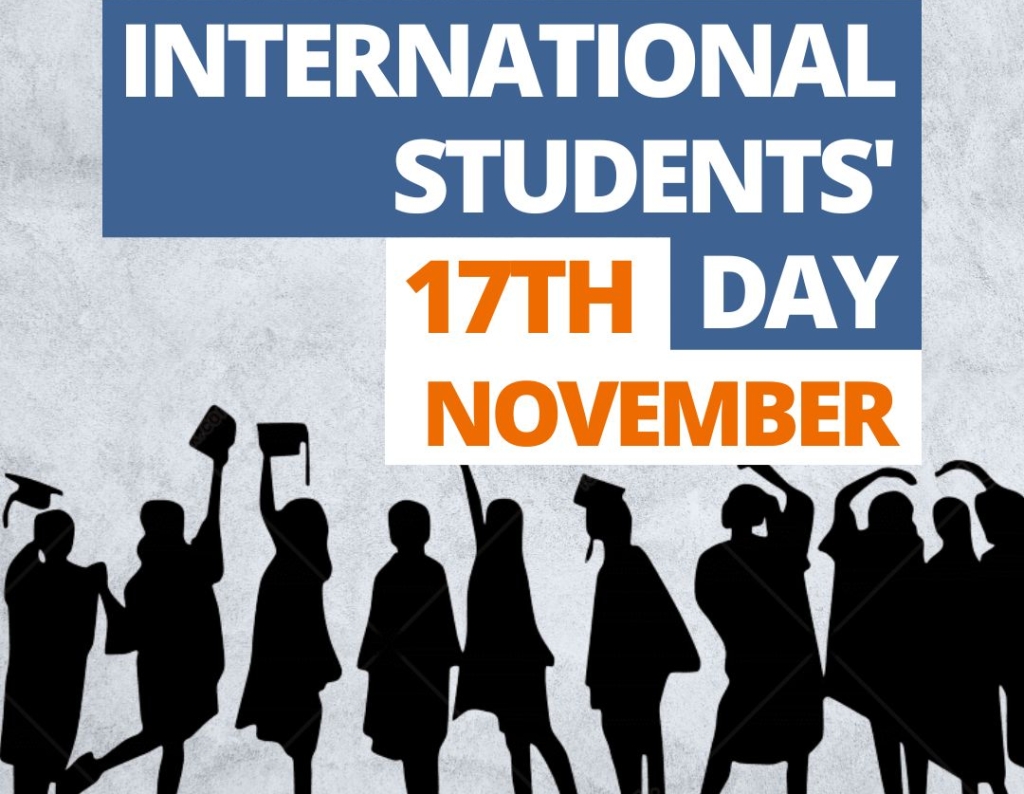
International Students’ Day is celebrated on 17 November as a symbol of the struggle for democratic education and society, as well as the memory of when the Nazis executed 20 Czechoslovak students who protested against the occupation in 1939.
More than 1,200 students were then taken to concentration camps, while the dormitories and the Universities were turned into barracks. The International Council of Students later proclaimed November 17 as International Students’ Day in London, and fifty years later, in 1989, students in what was then Czechoslovakia rose again against another non-democratic regime, which started the revolution that ended the communist regime.
Every year, this date allows us to show the public what students and young people have done for our society. The generations before us fought in times of great crises and wars to provide us with the state we have now in the education system, and we must be committed to continuing diligently to achieve changes. Remembering and celebrating this day when young people lost their lives fighting for justice and democracy is important so that we don’t forget the sacrifices made for our future.
Ninety years later, we managed to face and fight against the pandemic, and now another obstacle that stands in the way of students and can jeopardize their education and future is the war in Ukraine. It is difficult to imagine the actual situation in the country, where the losses are great, but the citizens still show ambition and hope toward themselves and their environment. The Russian invasion of Ukraine had devastating consequences for higher education, and The IDM together with the Danube Rectors’ Conference (DRC) decided to grant two Ukrainian students or early-career researchers a fellowship. We are extremely proud of the activities of our two trainees Olga Kyrychenko and Anastasiya Lendel who haven’t just shown strength but also consistency in going forward while completing research on their MA or PhD thesis.
We have the pleasure of hosting different students not only from the Danube region but also internationally that continuously share their knowledge from diverse study areas. They bring cultural, political, and historical perspectives that help build a vibrant environment. The IDM provides a workplace and invites the student to participate in the activities of the Institute as well as to contribute to the work of IDM team members yearly. To learn more about our former trainees and also about the opportunity of joining us for a possible traineeship, click here.
Author:
Darija Benić
Danubius Awards 2022
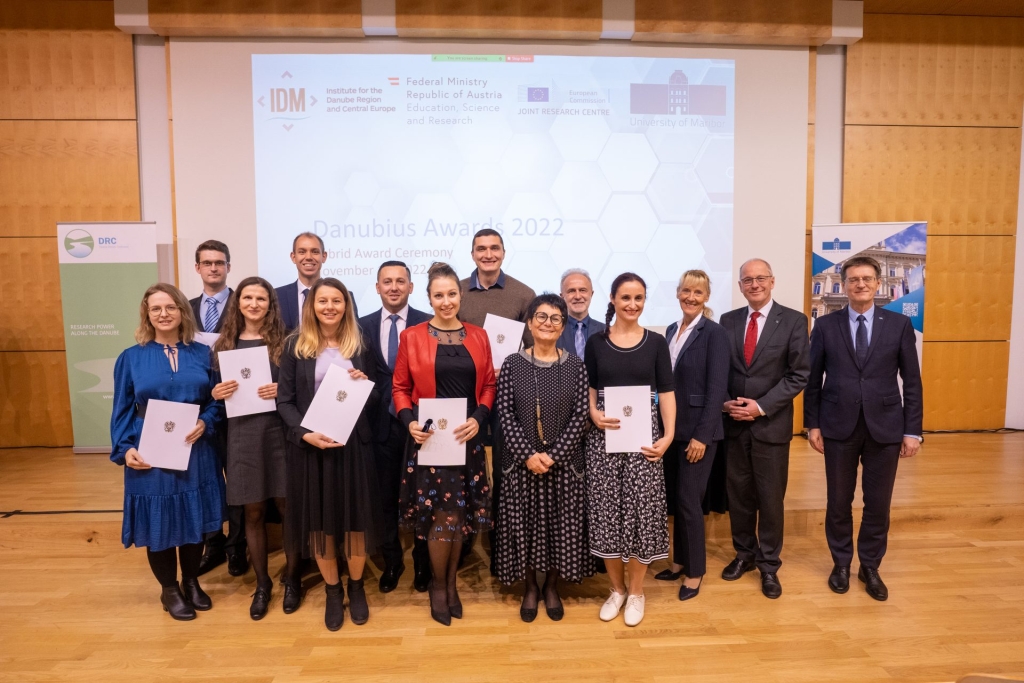
Danubius Award 2022 to the Bulgarian scientist Prof. Dr. Diana Mishkova, Danubius Mid-Career Award to Ukrainian scientist Assoc. Prof. Dr. Tamara Martsenyuk and Danubius Young Scientist Awards to 13 promising researchers from the Danube region.
The “Danubius Award” 2022 goes to Bulgarian Prof. Dr. Diana Mishkova, History Professor and Director of the Centre for Advanced Study (CAS) in Sofia, Bulgaria. With her work focusing on modern and contemporary history of Eastern Europe, the modernization of South-Eastern Europe, European societies, and European peripheries as well as national identities, she has contributed profoundly to research on the Balkans. She is o the funding director of CAS Sofia, that is supported by numerous international sponsors, such as the Wissenschaftkolleg Berlin (Institute for Advanced Study Berlin). Prof. Dr. Mishkova has already received several awards for her scientific work and is involved in different international projects – currently in the Horizon 2020 project “PREVEX – Preventing Violent Extremism in the Balkans”.
Ukrainian scientist Assoc. Prof. Dr. Tamara Martsenyuk has been awarded the “Danubius Mid-Career Award” 2022. She is an Associate Professor at the National University of Kyiv-Mohyla Academy. In her studies, she focuses on gender research, social inequality issues, gender policies, social movements, and empowerment. In addition to numerous stays abroad and the participation in international research projects, she also brings her expertise to national policy forums and NGOs. Her research is currently focusing on the topic “Women’s involvement in Russia’s War against Ukraine”.
In addition, 13 young scientists from the Danube Region will be awarded with the Danubius Young Scientist Award 2022 for their scientific work.
By presenting these Awards, the Austrian Ministry for Education, Science and Research (BMBWF) is contributing to the implementation of the EU Strategy for the Danube Region (EUSDR) adopted by the European Council in 2011. Through the awarding of outstanding scientific achievements, the Danube region is made visible as a research area and the perception of its multidisciplinary challenges and potentials is strengthened.
“The Danube Region provides many opportunities for cross-border and regional cooperation among universities as well as research organizations. And there are, indeed, plenty of common challenges along the Danube and beyond which we need to jointly address and develop solutions for“ Federal Minister for Education, Science and Research Prof. Martin Polaschek pointed out on the occasion of the award ceremony on 10 November 2022 at the University of Maribor.
“The role of scientists and researchers has changed profoundly in the last decade. On the one hand, scientists and researchers are in a high demand to deliver fast results and provide evidence for critical policy decisions, and they have become indispensable in explaining and communicating the current knowledge available. On the other hand, we see a worrying rise in skepticism towards science and research as well as towards democracy in general, which creates a wide range of problems for and in our societies. We need to work together to counter this skepticism, and I am confident that all of you present and especially the awardees of today can and will contribute with their work towards demonstrating and communicating the relevance of science and research“, Polaschek continued.
The award ceremony in Maribor took place in the presence of Barbara Weitgruber, Head of the Department from the BMBWF, and Friedrich Faulhammer, Chairman of the Institute for the Danube Region and Central Europe (IDM).
In her introduction, Barbara Weitgruber highlighted the solidarity with Ukraine as partner country of the EUSDR: “We will continue our support to the Ukrainian researchers, who have come or aim of coming in the EU, as well as to those remained in Ukraine. In addition to that, we hope for an early beginning of the reconstructions, and we are getting ready for appropriate support measures”.
Friedrich Faulhammer added: “I am really pleased that once again we are working together with the Ministry for Education, Science and Research to honor scientists, who are significantly contributing to the development of knowledge and understanding within the Danube region in their various fields of research. This year, I am particularly pleased that we can also highlight the scientific work of Ukrainian female researchers, as they are currently forced to work under the conditions caused by the unjustified Russian attack on their country”.
The “Danubius Award” was established in 2011 to honor researchers who have outstandingly dealt with the Danube Region in their academic or artistic work. The prize is granted every year on a rotating basis for achievements in the humanities, cultural and social sciences (2022) or in life sciences and is endowed with € 5,000.
The “Danubius Mid-Career Award” is endowed with € 2,200 and has been awarded since 2017 to researchers who are from 5 to a maximum of 15 years after their last formal scientific degree or have equivalent scientific experience. The prize winners were selected by an independent jury of experts chaired by Univ. Prof. Dr. Stefan M. Newerkla (University of Vienna).
Since 2014, special young talent awards, the “Danubius Young Scientist Awards” have also been awarded. The prize, which is open to all disciplines, highlights the scientific work and talent of young researchers and increases the visibility of the excellence of the research community in the Danube Region. In this way, the prizes also contribute to the fact that young scientists deal with the river and the region in a variety of ways. The young talent prizes are endowed with € 1.350, per award winner. The selection was made by an international jury of experts, whereby the candidates for the award were nominated by their respective scientific institutions.
| Austria | Daniela Apaydin |
| Bosnia and Herzegovina | Marko Djukanović |
| Croatia | Jelena Kranjec Orlović |
| Czech Republic | Adela Grimes |
| Germany | Jan Schmitt |
| Hungary | Blanka Bartos |
| Moldova | Nicolae Arnaut |
| Montenegro | Miloš Brajović |
| Romania | Mihaela Cudalbeanu |
| Serbia | Zorana Miletić |
| Slovakia | Tibor Zsigmond |
| Slovenia | Žane Temova Rakuša |
| Ukraine | Illia Diahovchenko |
Watch the Award ceremony below
Revolutionale Talks (Leipzig): Malwina Talik at the panel discussion about democracy, the rule of law and culture of memory in Poland
Free elections, freedom of the press and the rule of law were hard-won in Poland in the 1980s. In recent years, the country has repeatedly come under international criticism for dismantling the rule of law. How are the hard-won democratic freedoms of that time remembered today and are they currently in danger? What about the democratic and political awareness of Polish civil society and the culture of remembrance in Poland?
Those were the core issues discussed during the third Revolutionale Talk (Leipzig): “Democracy in danger?! Developments in Rule of Law and Civil Society” on 3 November 2022 with Katarzyna Batko-Tołuć (Member of the Board at Watchdog Poland), Dr. Jacek Kołtan (Director’s Representative for Research at the European Solidarity Centre), Filip Pazderski (Senior Policy Analyst and Director of the Democracy and Civil Society Program of the Institute of Public Affairs ) and our colleague Malwina Talik (Research Associate at the Institute for the Danube Region and Central Europe).
You will find more information about the event here.
You can watch the discussion on the YouTube channel of the Revolutionale:
This could be of interest to you:
Revolutionale Talk 1: Conflicted Memory in Bosnia and Herzegovina
Revolutionale Talk 2: Burdened Memory: The State of Culture of Remembrance in Hungary
International Conference: Geopolitical Challenges of the Russian-Ukrainian War, from the Black Sea to the Arctic Ocean
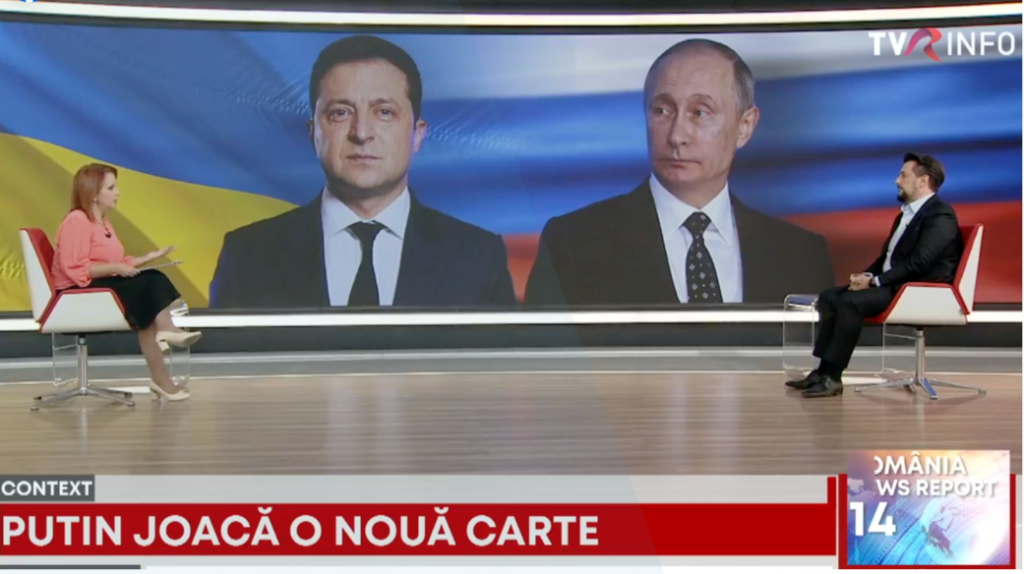
From 3 – 5 November 2022 the Romanian Center for Russian Studies at the University of Bucharest organised an International Conference: “Geopolitical Challenges of the Russian-Ukrainian War, from the Black Sea to the Arctic Ocean”. Mihai Răzvan Ungureanu, Director of the Center and Project Leader at IDM, welcomed amongst others members of the IDM International Council. Ulrich Schneckener held a keynote on What Comes After? Consequences of the War Against Ukraine for European Security Order(s). Andreas Umland held a presentation on Russian Fascism? Diverging Classifications of Putin’s Regime before and after 24 February 2022. Both also chaired a panel during the conference. IDM Managing Director Sebastian Schäffer presented Future Scenarios for Enlargement and European Integration in the Context of the Russian War Against Ukraine. During his stay in Bucharest, he was also invited to a talk show at the Romanian public broadcaster VR Info.
Author:
Sebastian Schäffer
You might also be interested in:

